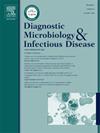Direct detection and rapid speciation and subspeciation of Mycobacterium avium complex using five-target multiplex PCR and clinical correlations in HIV-positive patients in Tehran, Iran
IF 1.8
4区 医学
Q3 INFECTIOUS DISEASES
Diagnostic microbiology and infectious disease
Pub Date : 2025-08-12
DOI:10.1016/j.diagmicrobio.2025.117064
引用次数: 0
Abstract
Disseminated Mycobacterium avium complex (DMAC) infection is a major AIDS-defining condition with diagnostic challenges due to nonspecific symptoms. This study, for the first time in Iran, aimed to discriminate MAC organisms in 100 HIV-positive patients directly from clinical specimens and assess their clinical significance, epidemiological characteristics, and associated risk factors through a detailed review of medical and demographic records. Clinical specimens (blood, sputum, and stool) were collected, and routine clinical evaluations were performed. Acid-fast bacilli were detected using Ziehl-Neelsen (ZN) staining, and multiplex conventional PCR assay was used for typing. Analytical sensitivity and specificity of the multiplex PCR were assessed. Data were analyzed using SPSS statistical software version 19 and analysis of variance (ANOVA test). A total of 28 MAC strains, consisting of 9 isolates of M. avium subsp. paratuberculosis, 6 isolates of M. avium subsp. avium, 11 isolates of M. intracellulare, and 2 isolates of M. genavense were detected in 100 HIV-positive patients. All 28 cases were identified as disseminated infections, including 14 with pulmonary involvement, 9 with gastrointestinal manifestations, and 3 presenting with skin abscesses. M. avium subsp. avium and M. intracellulare were identified in patients with disseminated infections who experienced treatment failure. The multiplex PCR demonstrated high analytical sensitivity and specificity. A significant relationship was found between alkaline phosphatase (ALP) levels, age, CD4 count, education level, treatment adherence, and opportunistic infection incidence (P<0.01). In conclusion, multiplex PCR demonstrated a rapid and reliable assay for direct detection of MAC species and subspecies, outperforming traditional diagnostic approaches.
伊朗德黑兰hiv阳性患者使用五靶点多重PCR直接检测和快速禽分枝杆菌复合体的种和亚种形成及其临床相关性
播散性鸟分枝杆菌复合体(DMAC)感染是一种主要的艾滋病定义疾病,由于非特异性症状而具有诊断挑战。这项研究首次在伊朗进行,旨在直接从临床标本中区分100名艾滋病毒阳性患者的MAC生物体,并通过详细审查医疗和人口记录来评估其临床意义、流行病学特征和相关风险因素。收集临床标本(血、痰、便),进行常规临床评价。Ziehl-Neelsen (ZN)染色法检测抗酸杆菌,多重常规PCR法分型。评估多重PCR的分析敏感性和特异性。数据分析采用SPSS 19版统计软件,方差分析(ANOVA检验)。共有28株MAC,其中禽分枝杆菌亚种9株。副结核,6株鸟分枝杆菌亚种。100例hiv阳性患者中检出11株胞内支原体和2株genavense支原体。所有28例病例均为播散性感染,其中14例肺部受累,9例胃肠道表现,3例皮肤脓肿。鸟分枝杆菌亚种在治疗失败的弥散性感染患者中发现了鸟状芽胞杆菌和胞内分枝杆菌。多重PCR具有较高的分析敏感性和特异性。碱性磷酸酶(ALP)水平与年龄、CD4计数、文化程度、治疗依从性和机会性感染发生率有显著相关(P<0.01)。综上所述,多重PCR是一种快速可靠的直接检测MAC种和亚种的方法,优于传统的诊断方法。
本文章由计算机程序翻译,如有差异,请以英文原文为准。
求助全文
约1分钟内获得全文
求助全文
来源期刊
CiteScore
5.30
自引率
3.40%
发文量
149
审稿时长
56 days
期刊介绍:
Diagnostic Microbiology and Infectious Disease keeps you informed of the latest developments in clinical microbiology and the diagnosis and treatment of infectious diseases. Packed with rigorously peer-reviewed articles and studies in bacteriology, immunology, immunoserology, infectious diseases, mycology, parasitology, and virology, the journal examines new procedures, unusual cases, controversial issues, and important new literature. Diagnostic Microbiology and Infectious Disease distinguished independent editorial board, consisting of experts from many medical specialties, ensures you extensive and authoritative coverage.

 求助内容:
求助内容: 应助结果提醒方式:
应助结果提醒方式:


